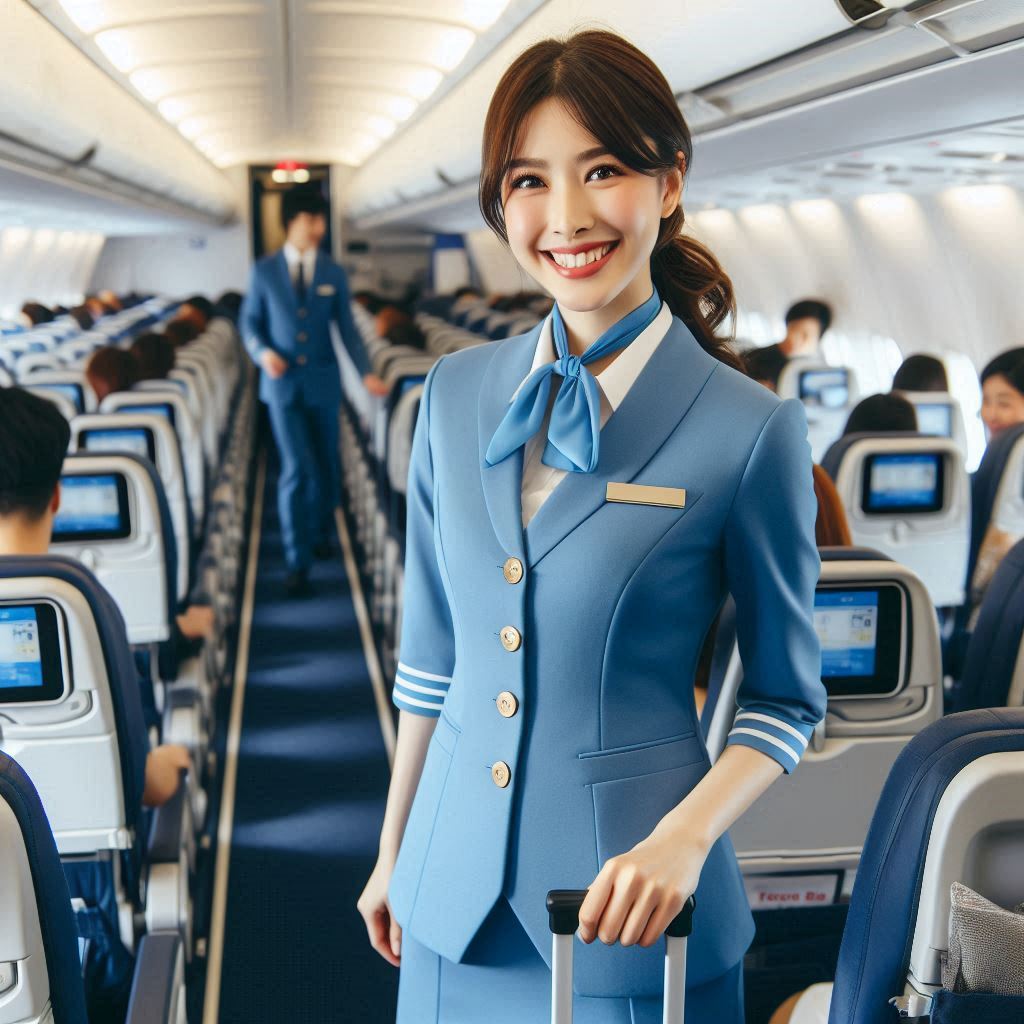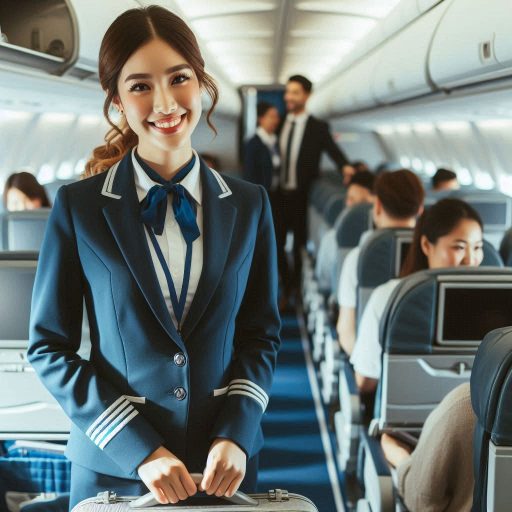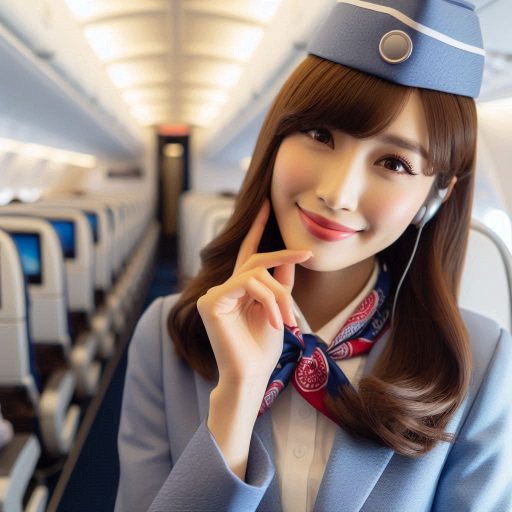Introduction
Being a flight attendant is a captivating career that attracts many individuals eager for adventure and new experiences.
This role offers a unique blend of travel, customer service, and teamwork, making it appealing for those who love exploring the world.
Flight attendants play a crucial part in ensuring passenger safety, providing exceptional service, and managing in-flight experiences.
They are responsible for conducting safety demonstrations, serving meals, and addressing passenger needs, all while maintaining a friendly demeanor.
The opportunity to travel to different destinations and meet people from diverse cultures is a significant draw for many aspiring flight attendants.
Imagine hopping from one city to another, experiencing various cuisines and customs, all as part of your job.
However, while the allure of travel is undeniable, being a flight attendant also comes with its share of challenges and drawbacks.
The job demands irregular hours, often requiring employees to work nights, weekends, and holidays.
This unpredictability can take a toll on personal relationships and work-life balance.
Additionally, the physical demands of the role, such as standing for long periods and managing heavy luggage, can be taxing.
Emotional resilience is also essential, as flight attendants must handle various passenger personalities and situations, from simple requests to emergencies.
Pros of Being a Flight Attendant
Travel Opportunities: Get to Visit Various Destinations Around the World
Being a flight attendant offers many unique advantages, with travel opportunities topping the list.
Flight attendants get to visit various destinations around the world.
They explore new cities, cultures, and cuisines during layovers.
This job allows them to travel to places many people only dream of seeing.
Each trip provides a chance to experience something new and exciting.
Meeting New People: Interact with Passengers from Diverse Backgrounds
Meeting new people is another significant benefit of this role.
Flight attendants interact with passengers from diverse backgrounds daily.
They build connections with travelers from different countries and cultures.
These interactions enrich their experiences and broaden their perspectives.
Each flight presents an opportunity to share stories and create lasting memories with interesting individuals.
Flexible Schedule: Have the Option to Choose Different Work Schedules
A flexible schedule is an attractive feature of being a flight attendant.
Many flight attendants have the option to choose different work schedules.
This flexibility allows them to plan their time off according to personal preferences.
They can enjoy longer vacations or spend quality time with family and friends.
The ability to adjust their schedules leads to a healthier work-life balance.
Competitive Salary: Earn a Decent Income with the Possibility of Bonuses and Benefits
The competitive salary adds to the appeal of being a flight attendant.
Many airlines offer decent income along with bonuses and benefits.
Salaries can vary based on experience and the airline, but many flight attendants earn a livable wage.
Additionally, flight attendants receive perks like discounted travel for themselves and their families.
This benefit significantly enhances their lifestyle and travel experiences.
Job Security and Continuous Training
Job security is another pro to consider in this career.
As air travel continues to grow, airlines need qualified flight attendants.
This demand can lead to stable job opportunities in a dynamic industry.
Flight attendants also receive continuous training and development.
This focus on skill enhancement prepares them for various situations, ensuring they remain competent and confident.
Dynamic Work Environment
Another advantage is the chance to work in a vibrant environment.
Each day is different, with new challenges and experiences.
This dynamic atmosphere keeps the job exciting and engaging.
Flight attendants often work as part of a close-knit team, supporting each other through long shifts and challenging situations.
Sense of Fulfillment
Lastly, flight attendants often enjoy a sense of fulfillment.
They play a crucial role in ensuring passenger safety and comfort.
This responsibility brings a sense of pride and accomplishment.
Helping others can be rewarding, making their work meaningful and impactful.
Being a flight attendant comes with numerous pros.
The opportunity to travel extensively, meet diverse people, and enjoy flexible schedules is appealing.
Competitive salaries, job security, and a dynamic work environment further enhance this career.
Overall, flight attendants experience a fulfilling and adventurous profession that many aspire to join.
Read: Nail Technician Networking: Building Industry Connections
Cons of Being a Flight Attendant
Being a flight attendant comes with its share of challenges.
While the job has many perks, several drawbacks can impact work-life balance and personal well-being.
Irregular Work Hours: May Have to Work Nights, Weekends, and Holidays
One major downside is irregular work hours.
Flight attendants often work nights, weekends, and holidays.
This unpredictable schedule can make it difficult to plan personal activities or celebrate special occasions.
Many flight attendants miss important family events due to flight schedules.
The constant adjustment to different time slots can disrupt their daily routines.
Health Risks: Exposure to Different Time Zones, Jet Lag, and Long Hours on Your Feet
Health risks also pose significant challenges.
Flight attendants frequently experience exposure to different time zones, leading to jet lag.
This can affect their sleep patterns and overall health.
Long hours on their feet can result in fatigue and physical discomfort.
Additionally, the high-altitude environment may contribute to dehydration and other health issues.
Maintaining a healthy lifestyle can become a struggle.
Limited Personal Time: May Have Difficulty Maintaining Personal Relationships or Hobbies
Limited personal time is another con of this profession.
Flight attendants may find it difficult to maintain personal relationships or engage in hobbies.
Their demanding schedules often leave little room for social activities.
Friends and family may not understand the erratic hours, leading to feelings of isolation.
Balancing personal life with work commitments can be particularly challenging.
Stressful Situations: Dealing with Demanding Passengers and Emergency Situations
Flight attendants also face stressful situations regularly.
They must deal with demanding passengers who may express frustration or anger.
Managing these interactions requires patience and strong communication skills.
Additionally, they are trained to handle emergency situations, which can be emotionally taxing.
The pressure to remain calm and composed during emergencies can be overwhelming.
Job-Related Burnout
Job-related burnout is another concern.
The combination of irregular hours, health risks, and stress can lead to physical and emotional exhaustion.
Over time, this can affect job performance and overall job satisfaction.
Flight attendants must prioritize self-care and find ways to cope with the demands of the job.
Limited Career Advancement
Limited career advancement opportunities can also be a drawback.
Many flight attendants find themselves in the same role for years.
While some airlines offer advancement paths, they may be competitive and require additional training.
This lack of upward mobility can lead to feelings of stagnation.
Being a flight attendant has its cons.
Irregular work hours, health risks, and limited personal time can strain life outside work.
Stressful situations and job-related burnout further complicate the role.
While the profession can be rewarding, potential flight attendants should consider these challenges carefully.
Balancing the pros and cons is essential for making an informed decision about pursuing this career.
Read: The Role of Technology in Modern Pet Grooming
Training and Requirements
Becoming a flight attendant requires specific training and meeting certain requirements.
This profession demands a unique blend of skills, safety knowledge, and personal attributes.
Training Needed to Become a Flight Attendant
Flight attendant training typically begins after hiring and can last several weeks.
Airlines provide comprehensive training programs covering various topics.
Trainees learn about company policies, service procedures, and in-flight safety protocols.
This training ensures that flight attendants can deliver exceptional customer service while maintaining safety.
During training, flight attendants also participate in simulations of emergency situations.
These scenarios help prepare them to handle various challenges they may encounter during flights.
Hands-on experience is crucial, allowing trainees to practice evacuation procedures and use emergency equipment.
Specific Requirements: Height, Language Proficiency, and Customer Service Skills
In addition to training, several specific requirements exist for aspiring flight attendants.
Most airlines require candidates to meet certain height standards.
This requirement ensures that flight attendants can reach overhead compartments and safety equipment easily.
Height requirements can vary by airline but typically range from 5’0” to 6’0”.
Language proficiency is another essential requirement.
Flight attendants often interact with passengers from diverse backgrounds.
Being multilingual can enhance communication and improve the overall passenger experience.
Many airlines prefer candidates who can speak more than one language fluently.
Customer service skills are crucial for flight attendants.
They must possess excellent interpersonal skills to manage passenger needs effectively.
Previous experience in customer service roles is often beneficial.
Strong communication, empathy, and problem-solving skills are vital for success in this role.
Transform Your Career Today
Unlock a personalized career strategy that drives real results. Get tailored advice and a roadmap designed just for you.
Start NowImportance of Safety Training and Emergency Procedures
Safety training is one of the most critical components of flight attendant training.
Flight attendants play a crucial role in ensuring passenger safety during flights.
They must be well-versed in safety protocols and emergency procedures.
This knowledge allows them to respond quickly and effectively in emergency situations.
Training covers a range of safety topics, including how to use emergency equipment, conduct safety demonstrations, and manage in-flight emergencies.
Flight attendants also learn first aid and CPR techniques to assist passengers in need.
This focus on safety is paramount, as flight attendants are responsible for the well-being of all passengers on board.
Aspiring flight attendants must complete specific training and meet various requirements.
Training includes safety procedures, customer service skills, and emergency simulations.
Height and language proficiency are essential criteria for many airlines.
Ultimately, thorough training and a commitment to safety are vital for success in this rewarding profession.
Flight attendants play a key role in creating positive travel experiences while ensuring passenger safety.
Read: Customer Service Tips for Pet Grooming Professionals

Job Responsibilities
Flight attendants have a diverse range of responsibilities during a flight.
Their primary role is to ensure passenger safety and comfort while providing excellent customer service.
Understanding these duties is essential for anyone considering a career in this field.
Typical Duties of a Flight Attendant During a Flight
During a flight, flight attendants perform several key duties.
Before takeoff, they conduct safety briefings, demonstrating emergency procedures and the use of safety equipment.
They also ensure that passengers are seated with seatbelts fastened and that carry-on luggage is properly stowed.
Once the flight is underway, flight attendants serve meals and beverages.
They take passenger orders, provide information about menu options, and accommodate special dietary needs.
Maintaining a clean and organized cabin is also part of their duties, as they regularly check for trash and keep the aisles clear.
Importance of Maintaining Passenger Safety and Comfort
Maintaining passenger safety and comfort is paramount for flight attendants.
They must be vigilant and attentive throughout the flight.
This involves monitoring the cabin for any signs of distress or emergencies.
Flight attendants must also manage any conflicts or issues that arise among passengers, ensuring a pleasant atmosphere on board.
Creating a comfortable environment helps enhance the overall travel experience.
Flight attendants engage with passengers, addressing their needs and answering questions.
Providing assistance with seating arrangements, overhead compartments, and in-flight entertainment can significantly impact passenger satisfaction.
Responsibilities: Serving Meals, Handling Emergencies, and Providing Information to Passengers
In addition to serving meals and ensuring comfort, flight attendants are trained to handle emergencies.
They must respond swiftly and effectively to various situations, such as medical emergencies, turbulence, or security threats.
Flight attendants are trained to assess the situation, communicate with the flight crew, and take necessary actions to ensure passenger safety.
Providing information to passengers is another critical responsibility.
Flight attendants keep passengers informed about flight status, including delays and estimated arrival times.
They also share information about connecting flights, baggage claim, and airport procedures.
This communication helps passengers feel more at ease and informed during their journey.
In summary, flight attendants have various responsibilities that are essential to the flight experience.
Their duties include conducting safety briefings, serving meals, and maintaining a comfortable environment.
The importance of passenger safety cannot be overstated, as flight attendants are trained to handle emergencies and provide vital information.
Ultimately, their dedication to safety and customer service contributes to a positive travel experience for all passengers on board.
Read: Nail Technician Etiquette: Dos and Don’ts
Career Growth Opportunities
A career as a flight attendant offers various growth opportunities within the aviation industry.
With dedication and experience, flight attendants can advance their careers while exploring different roles and responsibilities.
Potential for Advancement in the Field of Aviation
Flight attendants have several pathways for career advancement.
Many airlines promote from within, allowing experienced flight attendants to move up the ranks.
Advancement often begins with becoming a senior flight attendant, where individuals take on additional responsibilities.
Senior flight attendants may lead safety briefings and mentor newer team members.
This role allows them to showcase leadership skills and deepen their knowledge of airline operations.
Possibility of Becoming a Senior Flight Attendant or Pursuing Other Roles
In addition to becoming senior flight attendants, individuals can pursue various roles within the airline industry.
Options include positions in training and development, where seasoned flight attendants educate new hires on safety and service protocols.
Others may transition to roles in management, such as cabin crew scheduling or customer service management.
Flight attendants may also have the chance to work in specialized areas, such as corporate flight services or private jets.
These positions often provide different experiences and may come with unique benefits, like less frequent travel.
Opportunity for Professional Development and Training Programs
Professional development is a crucial aspect of career growth for flight attendants.
Many airlines offer ongoing training programs to enhance skills and knowledge.
These programs can focus on safety procedures, customer service excellence, and conflict resolution techniques.
Attending workshops and conferences can also help flight attendants stay informed about industry trends and best practices.
Networking with professionals in the field can open doors to new opportunities and collaborations.
Some airlines even provide financial assistance for flight attendants seeking further education or certifications.
This support encourages continuous learning and skill enhancement, allowing individuals to progress in their careers.
Career growth opportunities for flight attendants are abundant.
Advancement can lead to roles such as senior flight attendant or management positions within the airline industry.
Professional development and ongoing training programs support skill enhancement and knowledge growth.
By embracing these opportunities, flight attendants can enjoy a fulfilling and dynamic career in aviation.
Work-Life Balance
Maintaining a work-life balance as a flight attendant presents unique challenges.
The nature of the job, with its irregular hours and extensive travel, can impact personal life and well-being.
However, with effective strategies and a focus on self-care, flight attendants can find ways to cope with these demands.
Challenges of Maintaining a Work-Life Balance
One of the primary challenges flight attendants face is the unpredictability of their schedules.
Working nights, weekends, and holidays can make it difficult to attend family events or maintain social connections.
This erratic work pattern may lead to feelings of isolation, as friends and family may not understand the demands of the job.
Frequent travel can also disrupt personal routines and commitments.
Flight attendants often find it challenging to stick to exercise programs, healthy eating, and regular sleep patterns.
This inconsistency can lead to fatigue and increased stress, making it harder to maintain a balanced life.
Strategies for Coping with the Demands of the Job and Staying Healthy
To cope with these challenges, flight attendants can implement several strategies.
One effective approach is to establish a flexible routine that accommodates their unpredictable schedule.
Setting aside specific times for exercise, meal preparation, and relaxation can help create a sense of stability.
Staying organized is essential for managing work and personal responsibilities.
Using calendars or apps to track flight schedules, personal commitments, and self-care activities can improve time management.
Prioritizing tasks can help ensure that important responsibilities are not overlooked.
Maintaining a healthy lifestyle is crucial for managing stress and fatigue.
Flight attendants should focus on nutritious eating and staying hydrated during flights.
Regular physical activity, even in short bursts, can help boost energy levels and improve overall well-being.
Incorporating mindfulness practices, such as meditation or deep breathing exercises, can also promote mental clarity and relaxation.
Importance of Self-Care and Taking Time Off to Recharge
Self-care plays a vital role in achieving work-life balance.
Flight attendants should prioritize taking time off to recharge, whether through scheduled vacations or short breaks between flights.
Disconnecting from work allows them to rest, rejuvenate, and reconnect with family and friends.
Engaging in hobbies and activities outside of work can also enhance overall well-being.
Pursuing interests, spending time in nature, or simply relaxing at home can provide a much-needed escape from the demands of the job.
Flight attendants face unique challenges in maintaining a work-life balance.
However, with effective strategies, such as establishing routines and prioritizing self-care, they can navigate these demands successfully.
Taking time off to recharge and engage in personal interests is essential for overall well-being.
By focusing on these aspects, flight attendants can lead fulfilling lives both in and out of the workplace.
Conclusion
Becoming a flight attendant offers unique experiences and challenges that can shape your career.
Throughout this discussion, we explored the key advantages, such as opportunities to travel, meet diverse people, and enjoy flexible schedules.
These perks can create an exciting and fulfilling work environment.
However, this career also presents significant challenges.
Flight attendants often face irregular hours, demanding physical tasks, and emotional stress from dealing with passengers.
It’s essential to consider whether the benefits truly outweigh the drawbacks for your lifestyle and personal goals.
Before pursuing this path, weigh the pros and cons carefully.
Take time to reflect on what matters most to you in a career.
Research the industry thoroughly to understand the training and certification requirements, as they can vary by airline.
For those interested in this career, many resources are available to help you make an informed decision.
Check airline websites for job openings and training programs.
Organizations like the Flight Attendant Union can provide valuable insights into the industry, including networking opportunities and mentorship programs.
[E-Books for Sale]
The Big Book of 500 High-Paying Jobs in America: Unlock Your Earning Potential
$19.99 • 500 High-Paying Jobs • 330 pages
Explore 500 high-paying jobs in America and learn how to boost your career, earn more, and achieve success!
See All 500 High-Paying Jobs of this E-Book
1001 Professions Without a Degree: High-Paying American Jobs You Can Start Now
$19.99 • 1001 Professions Without a Degree • 174 pages
Discover 1001 high-paying jobs without a degree! Unlock career tips, skills, and success strategies for just $19.99!




